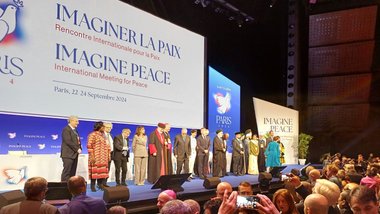To recognize or to ignore: how Orthodox Churches treat the OCU
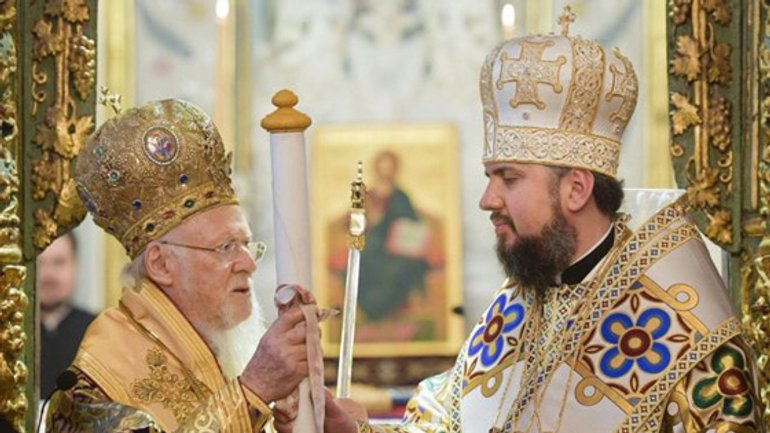
Autocephalous Orthodox Churches are currently debating over this very question. Nearly two months have passed since the United Synod and one month since Constantinople signed Tomos, and yet the official position of the other Churches still is not declared. However, this does not mean that we are not aware of the opinions within the Orthodox world. After all, it may feel like a long time for the public while it is but an instant for the Church. It's like waiting in a toilet queue - time seems to pass differently depending on your location. In this material, we have collected the reactions and statements of the Bishops of the Local Churches and information on the possible consideration of the "Ukrainian issue" by their governing bodies.
The Ecumenical Patriarchate of Constantinople
The case of the Mother-Church is the easiest for the Ecumenical Patriarchate actively promoted, provided, and was the first to recognize Ukrainian autocephaly. The joint worship service on January 6 in Fanar effectively attested to it.
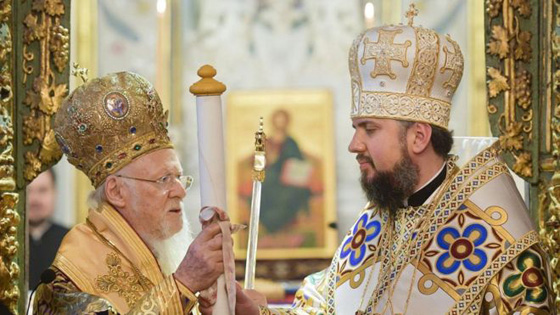
Besides Constantinople, some positive developments are taking place in Athos, which is within its jurisdiction. The superiors of the monasteries of Vatoped and Xenophontos attended Metropolitan Epifaniy's enthronement. This testifies to the recognition of Epifaniy as the canonical leader of the canonical Church.
The Patriarchate of Alexandria
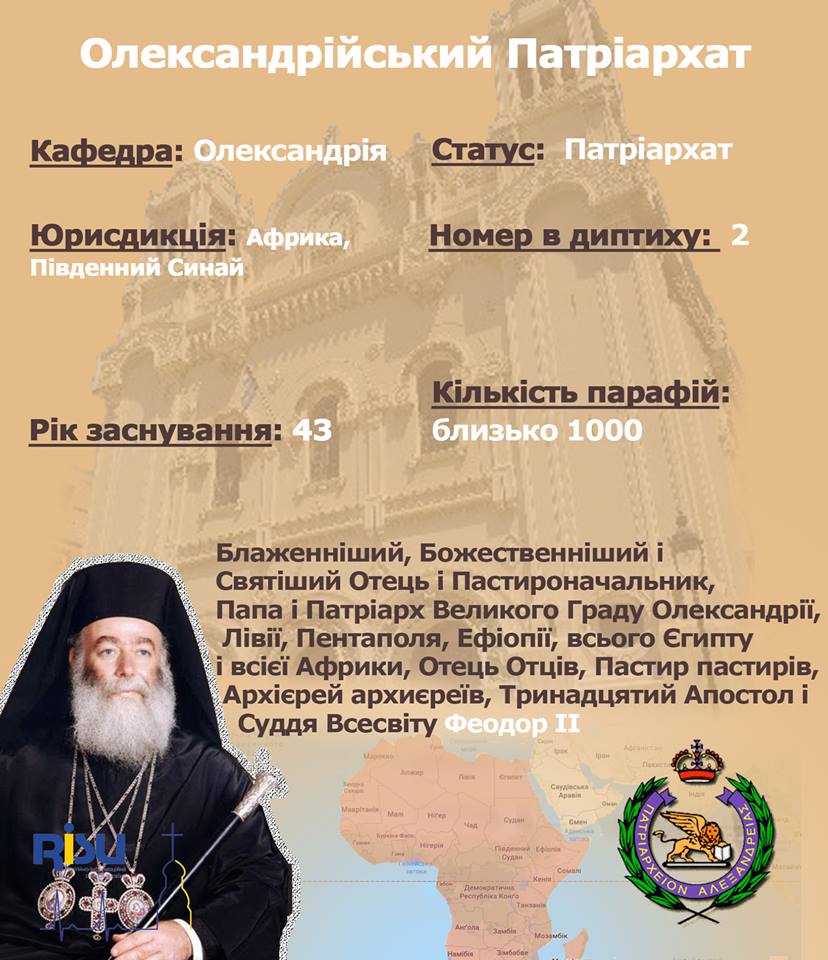
The second Orthodox party hasn't made their mind regarding OCU. Although its leader ‒ the Judge of the Universe (according to the official title) already expressed support for the Metropolitan Onufriy several times this year.
However, the Orthodox Pope has made statements in support of a new Autocephalous Church "with His Beatitude Metropolitan Savva we signed the document attesting that we are with the canonical Orthodox Church in Ukraine" ‒ a quote from the official UOC (MP) website.
Greek observers remarked that the Patriarch of Alexandria makes public ritual gestures towards the head of the UOC (MP) as to the head of the Autocephalous Church. This is a tangible evidence of Theodore supporting autocephaly of Ukraine.
The Patriarchate of Antioch
The third Orthodox party has Lebanon and war-torn Syria within its canonical territories, which were visited by Deputy of the Russian State Duma Dmitry Sablin in 2018. Later on, he claimed that Patriarch John X condemned Ukrainian autocephaly, while the official website of the Patriarchate provided no such information. The public had to take the Deputy's words at face value while he negotiated the annexation of the Crimea under the disguise of Gifts of the Magi.
As it became known, this Church calls for a Pan-Orthodox meeting regarding the granting of autocephaly. Yet at the same time, it is one of the four Churches that ignored the last Pan-Orthodox Council of 2016. Moreover, they emphasize that all decisions should be taken by consensus, meaning that every Church shall have the right of veto. Such conditions make it nearly impossible to proclaim any Autocephalous Church.
The Patriarchate of Jerusalem
Observers consider the Jerusalem Church quite pro-Fanar since it turns to the Ecumenical Patriarch while in crisis. Thus, in 2005, Patriarch Bartholomew supported the Synod of the Church of Jerusalem in its conflict with Patriarch Irenaeus, who has retired. The current Patriarch Theophilus, who also conflicts with the Synod, owes his to Bartholomew.
Also, during the acute stage of the conflict between Constantinople and Moscow, the Patriarch of Jerusalem asked for myrrh and paid a whole bunch of compliments, which hints at a certain position.
On the other hand, Theophilos has practically refused to meet with Poroshenko during his official visit to Israel, under the guise of poor health. Yet the very next day the Patriarch met with a delegation of the Odessa Diocese of the UOC (MP).
In general, this Church tries to avoid any public statements regarding the Ukrainian issue.
The Russian Church
The Patriarchate of Moscow has consistently opposed the Ukrainian autocephaly. Because of this, the ROC broke up Eucharistic communication with Fanar.
Moreover, some speakers claimed that an alternative Pan-Orthodox Council should be convened and the Patriarch of Constantinople, as well as all those Churches that disagree, should be convicted.
Patriarch Kirill himself has repeatedly stated that Russia would never accept Ukraine's autocephaly for they received Christianity from Kyiv, and therefore, it is their "spiritual Jerusalem".
The Serbian Church
This Church probably the most critical of Ukraine's autocephaly. Such dislike for the ecclesiastical independence of others has a rather simple explanation - the territorial integrity of the Serbian Church is barely holding. The Montenegrin and Macedonian Churches intend to leave. SOC public statements are the same phantom pains for a lost empire experienced by the Russians.
In 2018, Patriarch Irenaeus of Serbia even wrote a short letter to Bartholomew reprimanding his involvement in “Ukrainian affairs”. Last year in May, the head of the Serbian Church became a laureate of the Russian Orthodox Unity Fund with the stated remuneration of $ 250,000. Experts consider it a bribe to ensure the Patriarch's demonstrable anti-Ukrainian activity. By the way, at another reception with Patriarch Kirill, Irenaeus of Serbia stated that he did not recognize the Orthodox Church of Ukraine.
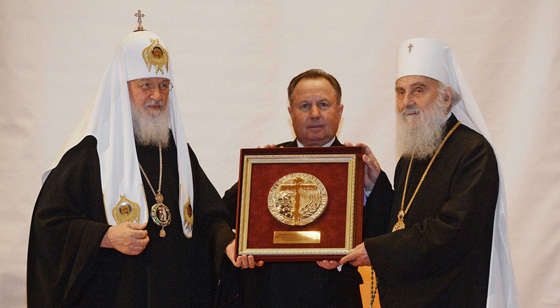
In one of his recent interviews, Irenaeus explained that his Church is "neither for nor against the Greeks and the Russians as it merely adheres to the canons and the centuries-old canonical order". However, Irenaeus did not elaborate on the canons violated by the Ecumenical Patriarch in providing OCU autocephaly.
However, even in this Church, some disagree with such judgments. Recently, research portal Cerkvarium announced the split in SOC caused by Ukraine. Young Bishop Maksim (Vasiljević) compared Tomos granted to Serbia in the thirteenth century and Ukrainian Autocephaly. He concluded that if the Serbs recognize and take pride in their history, they have to do the same toward Ukraine. "Maybe Moscow and some other consider that Constantinople made a mistake but in the end, it’s the beginning of the deep unity that will come after us," he muses.
The Romanian Church
One of the largest of the Local Orthodox Churches has pointedly refrained from public statements regarding OCU. We haven't heard about official documents or private opinions regarding the new sister Church. However, according to TSN (video at 06:45), the Holy Synod of RomOC will gather to consider the Ukrainian issue in February.
Analysts also note that Bucharest may support the approval of Ukraine's autocephaly in opposition to Moscow. It is a dispute between the ROC and RomOC concerning Moldova. Bucharest also need allies in its dispute with Moscow, meaning the interests of Kyiv, Bucharest and Fanar align.
The Georgian Church
Georgian Church is going through rather interesting metamorphoses. Until recently it was considered very Pro-Russian. Georgians supported the ROC in the boycott of the Pan-Orthodox Conference in Crete (2016), and many of their bishops, including the Patriarch himself, received their education in Russia and consider themselves ROC's friends.
However, after the Unification of the Cathedral, it became known that the GOC would consider the Ukrainian issue at the Synod at the end of December 2018 but then decided to wait until Tomos.
In late January, the GOC issued an official statement condemning the insults and blackmail in the Ukrainian issue, as well as the attempts to destroy the of the Orthodox world. GOC did not take the side of either party though. Church experts say that the Moscow Patriarchate is solely responsible for harassment, blackmail, and the integrity destruction, thus we can consider this statement a condemnation of Moscow's actions.
10 bishops of the GOC proclaimed their support for the autocephaly (the complete list is available on Cerkvarium website). For instance, the Metropolitan of Cilkan and Dushetsky Zosima (Shioshvili) promised that "the Georgian Church would support the autocephaly of the Ukrainian Orthodox Church." Western American Bishop Savva made a public claim to vote in support of the recognition of the OCU's autocephaly.
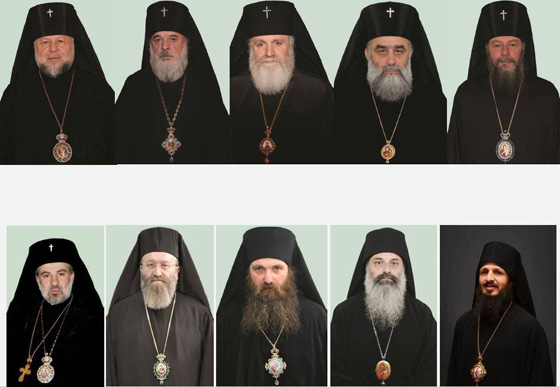
Furthermore, it seems that relations between the ROC and the GOC begin to strain. At the end of January 2019, in his interview with the head of the Department for External Church of the Moscow Patriarchate, Metropolitan Hilarion (Alfeyev) hinted that if Georgian Church recognized the OCU, the ROC would recognize Abkhazian Church. Georgia responded to this blackmail with an acute statement condemning the construction of the MP metochion at the Russian military base in the occupied Tskhinvali.
Georgians also hinted that bribe with a place in the Diptych would not do ‒ "the fact that the Moscow Patriarchate puts the Georgian Orthodox Church on the sixth place in the diptychs, and Constantinople, on the ninth, does not mean that the Georgian Orthodox Church has to regard the ROC's stand on the Ukrainian issue".
The Bulgarian Church
Just like its Georgian counterpart, the Bulgarian Church was considered to be Pro-Russian for the same reasons. However, after the scandal in March 2018, Bulgarians seemingly decided to leave Moscow's orbit. It was caused by the Patriarch Kirill's visit to the anniversary of the Russo-Turkish war where he started to teach the Bulgarian President and Prime Minister history and reprimand them for their disrespect to the "Russian soldier". You can read about this scandal in the special material of RISU.
As for the OCU, the first three Pro-Russian Metropolitans suggested to bring up the Ukrainian issue at the Pan-Orthodox Council, but the Synod of the BOC did not support the idea. Then a Commission to study the Ukrainian case was formed.
On 25 January 2019, the Ukrainian issue was on the agenda of the BOC Synod. According to the Bulgarian press, the Synod was divided in their opinions. The shaky majority (8 of 15 including the Patriarch himself) supporting the OCU recognition and 7 against it. Patriarch Neophyte stated that an independent state ought to have an Autocephalous Church. The Synod did not come to a decision and passed the question along to the canonical Commission.
The Church of Cyprus
In November 2018, after the Eucharistic communication between the Orthodox Church and Constantinople ceased, the Church of Cyprus urged to avoid statements that might worsen the situation and claimed to be in communion with all the Autocephalous Churches.
And in January 2019, the head of the Church Archbishop Chrysostomos announced his plans to recognize Metropolitan Epifaniy. "The time will come when kyr Epifaniy comes to Cyprus and we serve together," ‒ he said.
Ukrainian autocephaly was on the agenda of the Synod of the Church of Cyprus on February 7. The bishops exchanged views on the subject and promised to make a final decision at an extraordinary session of the Synod on February 18, 2019.
The Church of Greece
This Church is considered one of the closest to Fanar. The Church of Greece is the only one that supported Constantinople and did not attend the Council of Bishops of the Russian Orthodox Church in 2017. It is expected that Athens will be one of the first to recognize the OCU.
Synod of this Church has considered this question within two days after Tomos was granted to the OCU and gave it to the Council of Bishops for further consideration. According to Cerkvarium, such Council may take place in February 2019. Greek bishops are ready to support the OCU autocephaly. They will not even debate over it for "we can't side with the Russians" ‒ Greek religious resource reports.
The Church of Albania
The small Church of predominantly Muslim Albania is often lost among the other Orthodox giants. And though its faithful are less in number than residents of the typical residential district of Kyiv, it has the same rights, and most importantly, the power of voice on the Pan-Orthodox arena as the ROC.
Albania recovered its Orthodoxy in 1990s thanks to Constantinople. This Church looked up to Fanar in inter-Church disputes due to their amicable relations and Tomos' direct principle of autocephaly.
In May 2018, Patriarch Kirill visited Albania. Although the Moscow Patriarchate cheerfully reported their victory, however, they smoothly dropped the subject of the unpleasant statement of Archbishop Anastasios of Albania. He told Kirill straight to his face that the primacy does not depend on the Church's size or the number of parishioners, but love. Anastasios also urged not to look for reasons to split but strive to preserve unity.
Kirill did not heed this advice though, and the ROC broke up Eucharistic communication with Constantinople. After that, Archbishop Anastasios sent another letter condemning the use of Holy Communion as an instrument of war among the Churches.
The Polish Autocephalous Orthodox Church
The adjacent Church, born from the womb of the Kyiv metropolis, was not too eager to see her Mother Church become Autocephalous. The UOC (MP) had been actively using that knowledge in the past year. They tried to persuade the Metropolitan Sawa to support Metropolitan Onufriy. Warsaw Bishop allegedly sent a letter, but the UOC (MP) refused to make it public. RISU has published a detailed analysis of this case.
Later, Metropolitan Sawa sent a letter to Patriarch Bartholomew with a request to conduct a Pan-Orthodox council on the Ukrainian issue.
Recently Sawa has taken a step further ‒ he does not consider Epifaniy Metropolitan. The head of the Polish Church says that he is not against autocephaly, but everything has to be according to Canons, though Sawa was unable to specify which canons.
Orthodox Church of the Czech lands and Slovakia
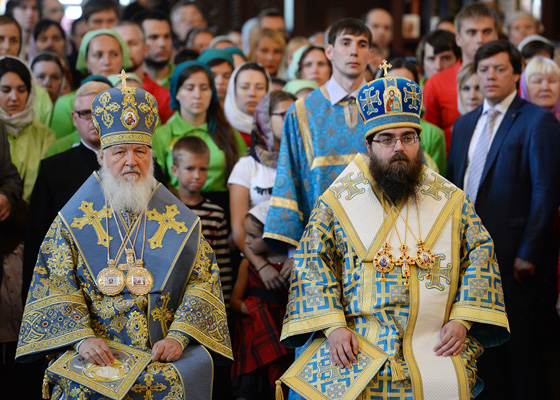
The Czech Church is likely to support the ROC. Back in mid-2018, its head Metropolitan Rostyslav practically reiterated the ROC's position to overcome the split by returning to the Church, namely to the ROC. He also claimed to support the UOC (MP) and Metropolitan Onufriy personally.
On January 29, the Synod of the Czech Church had a meeting, but all materials were classified. At the anniversary of Patriarch Kirill, Metropolitan Rostyslav said that the OCCLS up calls for bringing the Ukrainian issue at the Orthodox level.
Afterword
It is now evident that four autocephalous Churches support the Moscow Patriarchate on the Ukrainian issue. Three of them - Churches of Antioch, Poland and the Czech Republic call on Constantinople to bring up the "Ukrainian issue" at the All-Orthodox Council. This will put the final nail in its coffin because of these Churches' veto. We know that the pro-Russian bishops in Bulgaria tried to support this issue, but the Bulgarian Synod did not.
The Serbian Church also supports Russia. Its Patriarch does not even consider bringing up the issue of autocephaly at the Pan-Orthodox level; he is against any autocephaly since two Churches seeking recognition have already left him.
The Georgian and Bulgarian Churches left the pro-Russian camp. The Greek Orthodox Churches (Churches of Hellas and Cyprus) are likely to be the first to recognize the OCU.









